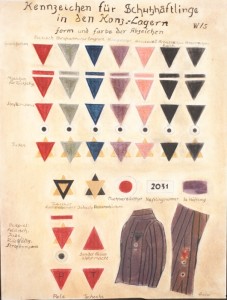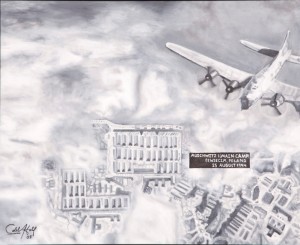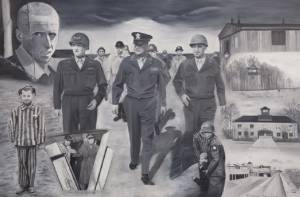Ben Abraham was taken to Braunschweig, but stayed only one day in that camp. He was then transferred to Wochelde, which was twelve and a half miles away.
In that camp Ben Abraham and the other prisoners were identified by their numbers and a symbol sewn on their uniforms: a yellow triangle for Jews; a red triangle for political prisoners; a pink triangle for homosexuals; a black triangle for criminals; and a violet triangle for the religious and those who had refused to participate in the war.

The day following his arrival in Wochelde, Ben Abraham started working in a factory of truck parts called Bussing. In that factory there were foreigners who were also forced to work but who apparently would not be killed afterwards. He was put in charge of the maintenance of the machines of the factory, along with three other mechanics. The food they received in the factory was relatively good, but he began to think about a way to get more food.
Shortly after, the situation changed and the supplies of the factory began to be controlled by the SS, diminishing the ration of food. As winter came, there were no more fruits and the field was covered with snow. Meanwhile, Ben Abraham continued with his strategies to get more food. He became known for his ability as a mechanic, and gained sympathy from the foreign managers, who now and then brought him something to eat.
One of his Ben Abraham’s cell mates asked for his help to find a way to enter the storage room of the SS to get food. They managed to do it successfully for the first 4 times, but the fifth time they were caught. He had fallen into a barrel of jelly, and it was impossible to hide from the SS official what he had done. He and his companion waited a few days to be executed, but apparently his ability as a mechanic was more important than his “crime,” so he was not killed. He received fifty-six blows as punishment.
After this incident, Ben Abraham was tracked and followed all the time inside the factory. In order to survive and get more food from the foreigners, he devised a way to make lighters and sell them to the German prisoners in exchange for food.
In March, 1945, new orders came for the prisoners to be evacuated because the Americans were advancing, while the Germans were retreating in panic. On March 21st, Ben Abraham’s group was to be deported to a factory in Braunschweig, where he could find no way of getting any extra food. There he was told they were to be transferred to a weapon factory in Watenstadt. They marched to the city of Braunschweig and found it completely ruined by incendiary bombs. Those who could not keep on marching were shot by the Ukrainian SS who marched in the rearguard.
Following their arrival in Watenstadt, Ben Abraham was supposed to be sent to Hildesheim, where ammunition factories were located. Since he did not present himself as a mechanic, he was left behind and remained in the famous “Herman Göring Wärke.” He was sent to a bloc where all prisoners served as internal workers of the factory, where food and hygiene conditions were better than in the other blocs. He regretted he did not go to Hildesheim, thinking he had made the wrong decision to stay where he was.

One day, the “Herman Göring Wärke” was bombed. While the SS panicked, Ben Abraham and his fellow inmates calmly stood by a window watching. He witnessed half of Bloc Three, where the Blocaltesters and the Kapos were lodging, being completely destroyed. He took a metal plate and ran to Bloc 3. Suddenly, a plane flew over him and then disappeared within seconds. It is possible that they did not shoot at him because he was wearing the striped uniform, and maybe this saved the camp from total bombardment. Nothing was left from the factories, but no other bomb fell on the other prisoners’ blocs.
In that same night, Ben Abraham was told that the Americans were coming and the prisoners were either going to be killed or transferred to another camp. At 4 a.m. he and the other men in his bloc were awakened by shouting SS officers, who ordered them to transport food supplies and clothing to the trains that would take them to another region of Germany.
After they had loaded the trains, they came back on foot to the camp, where they saw a huge mass of prisoners going to the trains under the hurried shouts of the SS. They had to evacuate the camp as soon as possible, since the Americans had already reached Braunschweig. Ben Abraham and his group mixed with the others and got onto the trains.
The trip to Neugame, a city near Hamburg, started – in open cargo cars. They were fortunate to have arrived there 2 hours late, because according to the Ukrainians, the SS had already drowned all Jewish prisoners.
They arrived at Ravensbruck after going several days without eating or drinking, travelling in cargo cars exposed to the sun and rain. Of the seventy prisoners in his Ben Abraham’s car, twenty-seven only were still alive.
The Ravensbruck camp was crowded with people from several other camps. Again Ben Abraham found himself in trouble for trying to get extra food, but he was saved by the Blockaltester of his block – a German with a red triangle, who pretended to have killed him, but simply changed the number badge he wore, so he would not be identified. Since all prisoners in the camp were very emaciated, there was no risk of him being recognized.
In the afternoon, an SS official came to Ben Abraham’s block to inspect the prisoners and called out his former prisoner number. As he had agreed with the Blockalstester, he did not present himself. The Blockaltester told the SS that he had killed that prisoner because he had stolen food, pointing to one of the corpses piled nearby.
One day, news came that the Red Cross would transfer the prisoners to Sweden and give them packs with supplies. Ben Abraham and his companions did not believe it; they thought this was just another trick of the Germans. But they did receive the supplies. The next day they were taken to trains supposedly bound for Sweden. He still did not believe that was true, but they entered the train anyway and started moving. Soon afterwards, he suffered from severe dysentery, just like all the other prisoners who had eaten the supplies that they were told had been sent by the Red Cross.
Two days afterwards, the SS said that the next train station had been bombed so they would have to walk until they reached the nearest camp, which was located near Ludwiglust. The Kapos of this camp stole all the supplies they had received.
In Ludwiglust they were put in barracks with no roofs, a sand floor and bare walls. There Ben Abraham found two men that had been transferred from Watenstadt to Hildesheim. They told him that, of the 150 mechanics that had been taken there, only the two of them had survived. The others had been killed during the evacuation of the camp. The Ukrainians and the Lithuanians were given one piece of bread for each Jew they killed.
On May 1st, Ben Abraham decided in his heart – the war would end. The Germans told them they would be evacuated again, for the Americans were advancing. As he had been suffering from dysentery for several days, he had no more strength to stand up and decided to remain where he was. But one of his companions helped him stand up and walk towards the train car, because one of the Kapos, who by this time was wearing the SS uniform that had been offered to those who volunteered to fight for Germany, told them that those who stayed behind would be executed.

Ben Abraham and his friend boarded a train car crowded with 150 prisoners. At the same time, he could hear Jews from other cars scream – they were trying to flee from the Ukrainians, who killed them mercilessly.
The two got a spot close to the door of the train, beside an obese SS official, who later disappeared. This gave them space to breath, in comparison to half of the prisoners in the car, who died asphyxiated beside one another that same night.
Already in a lethargic state, without any strength left to get rid of the corpses piled around him, Ben Abraham heard shouts: “The tanks, the tanks!” In a tremendous effort, he managed to raise his head and look outside at a column of tanks advancing slowly, all bearing a white five-pointed star.
Ben Abraham thought they were Russian tanks because he did not know that the Americans also used the star as a symbol. As the tanks came closer, the Russian prisoners shouted for joy, but the Jews only wept – they could not help weeping.
Continue Reading: Hard Work in Israel.